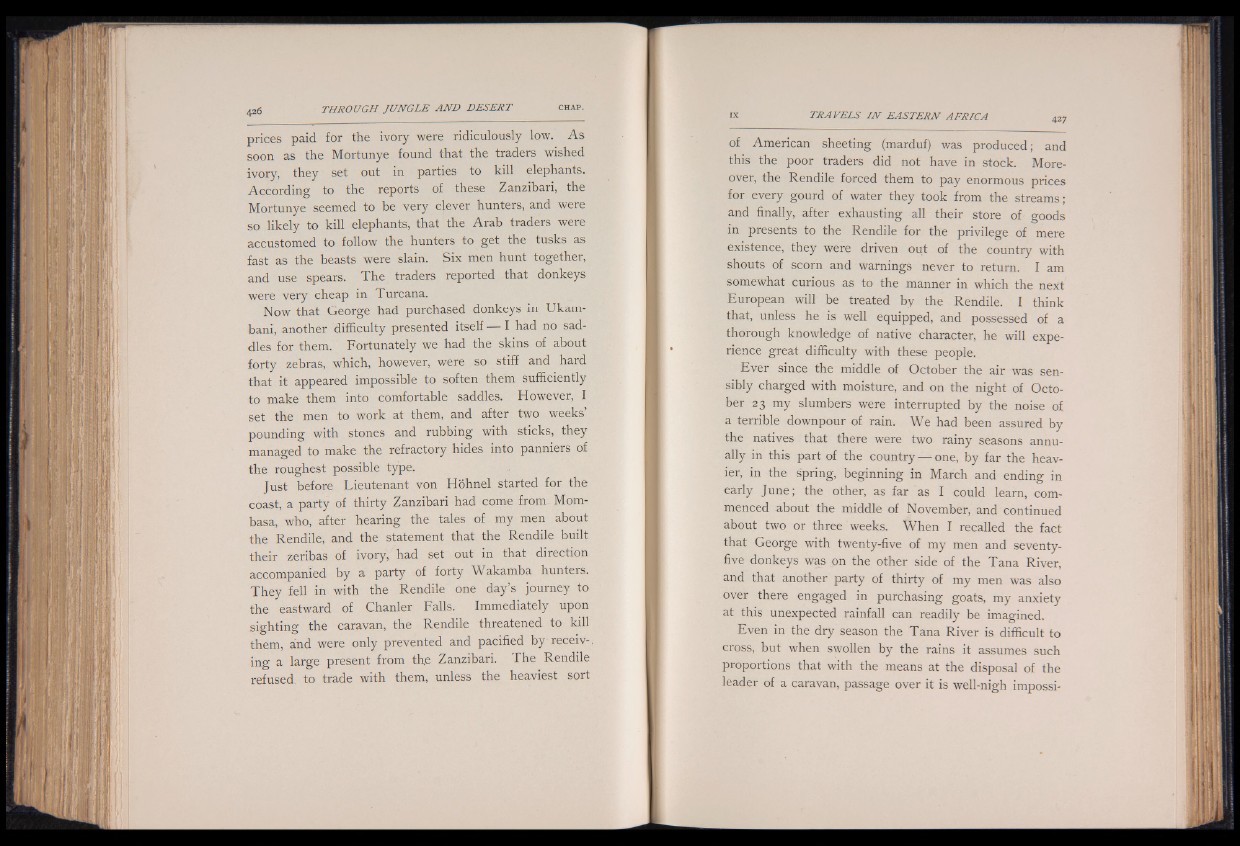
prices paid for the ivory were ridiculously low. As
soon as the Mortunye found that the traders wished
ivory, they set out in parties to kill elephants.
According to the reports of these Zanzibari, the
Mortunye seemed to be very clever hunters, and were
so likely to kill elephants, that the Arab traders were
accustomed to follow the hunters to get the tusks as
fast as the beasts were slain. Six men hunt together,
and use spears. The traders reported that donkeys
were very cheap in Turcana.
Now that George had purchased donkeys in Ukam-
bani, another difficulty presented itself — I had no saddles
for them. Fortunately we had the skins of about
forty zebras, which, however, were so stiff and hard
that it appeared impossible to soften them sufficiently
to make them into comfortable saddles. However, I
set the men to work at them, and after two weeks’
pounding with stones and rubbing with sticks, they
managed to make the refractory hides into panniers of
the roughest possible type.
Just before Lieutenant von Hohnel started for the
coast, a party of thirty Zanzibari had come from. Mombasa,
who, after hearing the tales of my men about
the Rendile, and the statement that the Rendile built
their zeribas of ivory, had set out in that direction
accompanied by a party of forty Wakamba hunters.
They fell in with the Rendile one day’s journey to
the eastward of Chanler Falls. Immediately upon
sighting the caravan, the Rendile threatened to kill
them, and were only prevented and pacified by receiving
a large present from the Zanzibari. The Rendile
refused to trade with them, unless the heaviest sort
of American sheeting (marduf) was produced; and
this the poor traders did not have in stock. Moreover,
the Rendile forced them to pay enormous prices
for every gourd of water they took from the streams;
and finally, after exhausting all their store of goods
in presents to the Rendile for the privilege of mere
existence, they were driven out of the country with
shouts of scorn and warnings never to return. I am
somewhat curious as to the manner in which the next
European will be treated by the Rendile. I think
that, unless he is well equipped, and possessed of a
thorough knowledge of native character, he will experience
great difficulty with these people.
Ever since the middle of October the air was sensibly
charged with moisture, and on the night of October
23 my slumbers were interrupted by the noise of
a terrible downpour of rain. We had been assured by
the natives that there were two rainy seasons annually
in this part of the country — one, by far the heavier,
in the spring, beginning in March and ending in
early June; the other, as far as I could learn, commenced
about the middle of November, and continued
about two or three weeks. When I recalled the fact
that George with twenty-five of my men and seventy-
five donkeys was on the other side of the Tana River,
and that another party of thirty of my men was also
over there engaged in purchasing goats, my anxiety
at this unexpected rainfall can readily be imagined.
Even in the dry season the Tana River is difficult to
cross, but when swollen by the rains it assumes such
proportions that with the means at the disposal of the
leader of a caravan, passage over it is well-nigh impossi